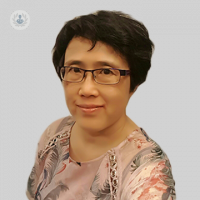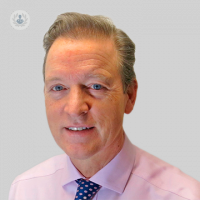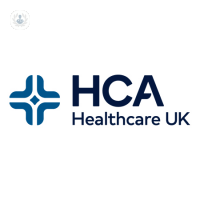What are benign breast lumps?
A benign breast lump is caused by the excessive growth of normal cells and tissues. The growth is not cancerous; it consists of tissue that helps to support the breast. There are common causes, which include changes in tissue, an infection, injury and medicines. Breast tissue is sensitive to hormone levels that change during the menstrual cycle. The most common types of benign breast lumps are known as fibroadenomas.

What are the symptoms of benign breast lumps?
The main symptom is the appearance of a hard cyst in the breast, which is painless when touched and which, not being attached to the skin, moves around. Other symptoms include breast discomfort and tenderness, irregular nodules or small lumps and dense breast tissue.
What are the causes of benign breast lumps?
Currently, the cause is not known, although it is believed that it may be due to a hormonal imbalance. It primarily affects women during puberty, the menstrual cycle and pregnancy. However, it also occurs, at a lower frequency, in postmenopausal women.
Can they be prevented?
There are some everyday measures that may help prevent the development of benign breast lumps. These are:
- Monthly breast self-examination and observation.
- A healthy diet.
- Reducing intake of trans saturated fats and carbohydrates, as these raise the level of oestrogens, which stimulate breast tissue.
- Avoiding caffeine, which contains methylxanthines, a substance that can overstimulate the growth of breast tissue.
- Not wearing bras so tightly that blood circulation is hindered.
What is the treatment for benign breast lumps?
A diagnosis is made using ultrasound and further refined with a needle biopsy. Given that benign breast lumps are related to hormonal changes in women, they do not always have to be removed and usually disappear by themselves within a couple of years.
When is surgery required for benign breast lumps?
Surgery is performed when the lump is growing rapidly, is causing discomfort or for aesthetic reasons. However, medical tests are necessary if a tumour is suspected.
11-13-2012 09-22-2023Benign breast lumps
What are benign breast lumps?
A benign breast lump is caused by the excessive growth of normal cells and tissues. The growth is not cancerous; it consists of tissue that helps to support the breast. There are common causes, which include changes in tissue, an infection, injury and medicines. Breast tissue is sensitive to hormone levels that change during the menstrual cycle. The most common types of benign breast lumps are known as fibroadenomas.

What are the symptoms of benign breast lumps?
The main symptom is the appearance of a hard cyst in the breast, which is painless when touched and which, not being attached to the skin, moves around. Other symptoms include breast discomfort and tenderness, irregular nodules or small lumps and dense breast tissue.
What are the causes of benign breast lumps?
Currently, the cause is not known, although it is believed that it may be due to a hormonal imbalance. It primarily affects women during puberty, the menstrual cycle and pregnancy. However, it also occurs, at a lower frequency, in postmenopausal women.
Can they be prevented?
There are some everyday measures that may help prevent the development of benign breast lumps. These are:
- Monthly breast self-examination and observation.
- A healthy diet.
- Reducing intake of trans saturated fats and carbohydrates, as these raise the level of oestrogens, which stimulate breast tissue.
- Avoiding caffeine, which contains methylxanthines, a substance that can overstimulate the growth of breast tissue.
- Not wearing bras so tightly that blood circulation is hindered.
What is the treatment for benign breast lumps?
A diagnosis is made using ultrasound and further refined with a needle biopsy. Given that benign breast lumps are related to hormonal changes in women, they do not always have to be removed and usually disappear by themselves within a couple of years.
When is surgery required for benign breast lumps?
Surgery is performed when the lump is growing rapidly, is causing discomfort or for aesthetic reasons. However, medical tests are necessary if a tumour is suspected.


Ask an expert: How are breast lumps assessed?
By Professor Kefah Mokbel
2025-01-13
Highly respected consultant oncoplastic breast surgeon Professor Kefah Mokbel explains how lumps in the breast are investigated in this expert guide. See more


An expert guide to non-cancerous breast conditions
By Mr Hazem Khout
2025-01-12
Finding painful lumps in the breast or experiencing nipple discharge can be alarming for many women. However, a benign (non-cancerous) condition may be the cause behind these symptoms. In this informative article, highly respected consultant oncoplastic breast surgeon Mr Hazem Khout expertly details which are the most common benign conditions of the breast as well as their diagnosis and treatment. See more


What is a benign breast lump?
By Miss Tena Walters
2025-01-09
Benign breast lumps are lumps in the breast that are benign, which means non-cancerous. That being said, no woman should ever assume that a new lump or change in the breast is benign until she has been seen by a specialist. Miss Tena Walters describes what non-cancerous breast lumps feel like and how often women should be screened for breast cancer. See more
Experts in Benign breast lumps
-
Miss Christina Choy
SurgeryExpert in:
- Benign breast lumps
- Breast augmentation
- Breast reconstruction
- Breast cancer
- Mastitis
- Breast ultrasound
-
Miss Tena Walters
SurgeryExpert in:
- Breast lumps
- Family history of breast cancer
- Breast pain
- Breast cancer
- Breastfeeding
- Benign breast lumps
-
Mr Abdul Kasem
SurgeryExpert in:
- Breast cancer
- Benign breast lumps
- Breast reconstruction
- Breast augmentation
- Breast reduction
- Breast lift or mastopexy
-
Professor Amtul Razzaq Carmichael
SurgeryExpert in:
- Breast cancer
- Oncoplastic and reconstructive breast surgery
- Nipple-sparing mastectomy
- Benign breast lumps
- Preventive mastectomy
- Sentinel lymph node biopsy
-
Mr Brendan Smith
SurgeryExpert in:
- Breast reconstruction
- Breast cancer
- Breast reduction
- Breast lift or mastopexy
- Breast augmentation
- Benign breast lumps
- See all

One Stop Breast Clinic at New Victoria Hospital
One Stop Breast Clinic at New Victoria Hospital
184 Coombe Lane West, Kingston upon Thames
No existe teléfono en el centro.
By using the telephone number provided by TOP DOCTORS, you automatically agree to let us use your phone number for statistical and commercial purposes. For further information, read our Privacy Policy
Top Doctors

The Lister Hospital - part of HCA Healthcare
The Lister Hospital - part of HCA Healthcare
Chelsea Bridge Road, London
No existe teléfono en el centro.
By using the telephone number provided by TOP DOCTORS, you automatically agree to let us use your phone number for statistical and commercial purposes. For further information, read our Privacy Policy
Top Doctors

108 Harley Street Medical
108 Harley Street Medical
108 Harley Street, W1G 7ET
No existe teléfono en el centro.
By using the telephone number provided by TOP DOCTORS, you automatically agree to let us use your phone number for statistical and commercial purposes. For further information, read our Privacy Policy
Top Doctors
-
One Stop Breast Clinic at New Victoria Hospital
184 Coombe Lane West, Kingston upon Thames, South LondonExpert in:
- Family history of breast cancer
- Biopsy
- Breast Cancer
- One Stop Breast Clinic
- Ultrasound
- Breast Pathology
-
The Lister Hospital - part of HCA Healthcare
Chelsea Bridge Road, London , Central LondonExpert in:
- Cancer
- Cardiology
- Orthopaedic surgery
- Pregnancy
- Physiotherapy
- Women’s health
-
108 Harley Street Medical
108 Harley Street, W1G 7ET, W1G Marylebone LondonExpert in:
- Vascular Surgery
- Dermatology
- Diagnostic Imaging
- Women’s health
- Sports Medicine
- Rehabilitation
- Most viewed diseases, medical tests, and treatments
- Menopause support
- Tubal factor infertility
- Complex endometriosis
- Fertility preservation
- Female infertility
- Ovulatory disorders
- Surrogacy
- Pelvic ultrasound
- Maternal mental health
- Weight loss injections








